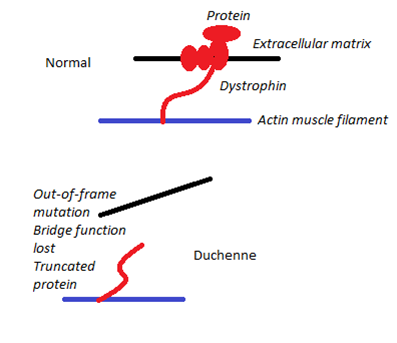Duchenne muscular dystrophy is the most common and severe form of muscular dystrophies, affecting 1 in 3500 male births. Young people with Duchenne have an alteration, known as a mutation in the dystrophin gene. The alteration means that they can’t produce the protein dystrophin, resulting in a progressive deterioration of muscle strength and function, where muscle is substituted with fat and connective tissue. If dystrophin remains present but in an altered form it will result in Becker muscular dystrophy (a similar but milder form of the disease). Current research into therapies for the disease is aimed at restoring dystrophin production.
Dystrophin is found in many cells in the body, mostly skeletal, cardiac and smooth muscle cells, and links the inside of the cell to the outside. It has a functional role of preventing damage caused by contraction. The disease is X-linked so mainly males are affected by this disease.


